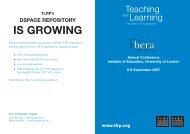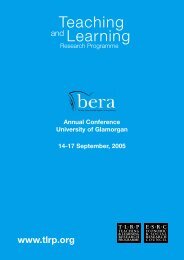Teachers - Teaching and Learning Research Programme
Teachers - Teaching and Learning Research Programme
Teachers - Teaching and Learning Research Programme
Create successful ePaper yourself
Turn your PDF publications into a flip-book with our unique Google optimized e-Paper software.
12<br />
The approach is now very different <strong>and</strong> schemes such as the recently inaugurated Best<br />
Practice <strong>Research</strong> Scholarships provided by the Department for Education <strong>and</strong><br />
Employment <strong>and</strong> the Teacher Training Agency’s, Teacher <strong>Research</strong> Grant Scheme<br />
expect teachers to do research in their own time <strong>and</strong> to use funding to support the cost of<br />
help from educational researchers in Institutes of Higher Education. In a different<br />
approach the new ESRC <strong>Teaching</strong> <strong>and</strong> <strong>Learning</strong> Initiative also places a high emphasis on<br />
teacher involvement. The projects involving schools in Phase II all impact on the<br />
concerns of teachers in the survey, particularly the emphasis on children’s learning <strong>and</strong><br />
social development. It is, however, one thing to have recognised the concerns of teachers<br />
but another to create conditions under which co-operation between the researchers <strong>and</strong><br />
the practitioners can bring about changes in practice that are sustainable <strong>and</strong> can then be<br />
disseminated in ways that broaden their impact. It is these two issues that I wish to<br />
address in the remainder of the paper.<br />
Changing Classroom Practice<br />
Interventions by researchers rarely succeed in sustaining change in classroom practice<br />
beyond the lifetime of the project (Fullan 1993; 1999). We have recently visited a<br />
number of schools involved in the previous government’s Superhighway initiative to<br />
explore how teachers in Y6 <strong>and</strong> Y7 are using ICT to support transfer. All initiatives<br />
appeared to have ceased once the commercial sponsorship was withdrawn. In a recent<br />
draft paper Milbrey McLaughlin 2 <strong>and</strong> her colleagues at Stamford University have<br />
reviewed a number of projects that set out to reform classroom practice by building upon<br />
‘promising theories of learning <strong>and</strong> instruction’. The review cites the case of a wealthy<br />
Texan philanthropist, who having looked at various bids for funding educational research<br />
asked the awards committee, ‘when are you going to stop drilling, <strong>and</strong> start pumping’?<br />
The three projects reviewed by McLaughlin share a similar rationale to those funded by<br />
TLRP. They sought to create changes in classroom practice that were based on specific<br />
principles linked to improvement in pupils learning as construed from theories of<br />
2 McLaughlin, M. with Mitra, D <strong>and</strong> Stokes, L. Theory-Based Change <strong>and</strong> Change –Based Theory: Going<br />
Deeper, Going Broader, Stanford University, February 2000, (Draft for Comment)

















